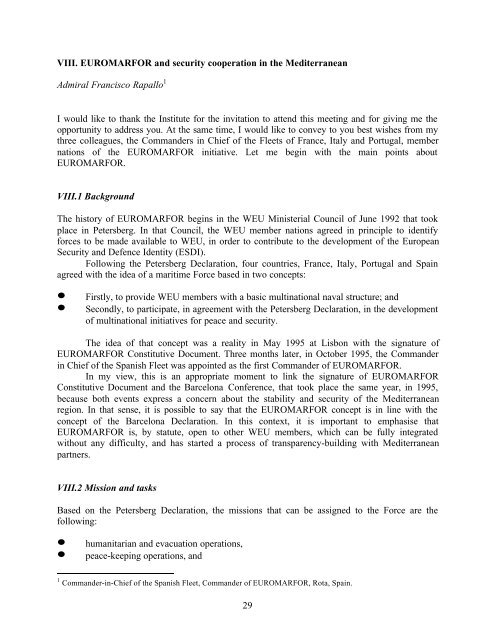The future of the Euro-Mediterannean security dialogue
The future of the Euro-Mediterannean security dialogue
The future of the Euro-Mediterannean security dialogue
Create successful ePaper yourself
Turn your PDF publications into a flip-book with our unique Google optimized e-Paper software.
VIII. EUROMARFOR and <strong>security</strong> cooperation in <strong>the</strong> Mediterranean<br />
Admiral Francisco Rapallo 1<br />
I would like to thank <strong>the</strong> Institute for <strong>the</strong> invitation to attend this meeting and for giving me <strong>the</strong><br />
opportunity to address you. At <strong>the</strong> same time, I would like to convey to you best wishes from my<br />
three colleagues, <strong>the</strong> Commanders in Chief <strong>of</strong> <strong>the</strong> Fleets <strong>of</strong> France, Italy and Portugal, member<br />
nations <strong>of</strong> <strong>the</strong> EUROMARFOR initiative. Let me begin with <strong>the</strong> main points about<br />
EUROMARFOR.<br />
VIII.1 Background<br />
<strong>The</strong> history <strong>of</strong> EUROMARFOR begins in <strong>the</strong> WEU Ministerial Council <strong>of</strong> June 1992 that took<br />
place in Petersberg. In that Council, <strong>the</strong> WEU member nations agreed in principle to identify<br />
forces to be made available to WEU, in order to contribute to <strong>the</strong> development <strong>of</strong> <strong>the</strong> <strong>Euro</strong>pean<br />
Security and Defence Identity (ESDI).<br />
Following <strong>the</strong> Petersberg Declaration, four countries, France, Italy, Portugal and Spain<br />
agreed with <strong>the</strong> idea <strong>of</strong> a maritime Force based in two concepts:<br />
• Firstly, to provide WEU members with a basic multinational naval structure; and<br />
• Secondly, to participate, in agreement with <strong>the</strong> Petersberg Declaration, in <strong>the</strong> development<br />
<strong>of</strong> multinational initiatives for peace and <strong>security</strong>.<br />
<strong>The</strong> idea <strong>of</strong> that concept was a reality in May 1995 at Lisbon with <strong>the</strong> signature <strong>of</strong><br />
EUROMARFOR Constitutive Document. Three months later, in October 1995, <strong>the</strong> Commander<br />
in Chief <strong>of</strong> <strong>the</strong> Spanish Fleet was appointed as <strong>the</strong> first Commander <strong>of</strong> EUROMARFOR.<br />
In my view, this is an appropriate moment to link <strong>the</strong> signature <strong>of</strong> EUROMARFOR<br />
Constitutive Document and <strong>the</strong> Barcelona Conference, that took place <strong>the</strong> same year, in 1995,<br />
because both events express a concern about <strong>the</strong> stability and <strong>security</strong> <strong>of</strong> <strong>the</strong> Mediterranean<br />
region. In that sense, it is possible to say that <strong>the</strong> EUROMARFOR concept is in line with <strong>the</strong><br />
concept <strong>of</strong> <strong>the</strong> Barcelona Declaration. In this context, it is important to emphasise that<br />
EUROMARFOR is, by statute, open to o<strong>the</strong>r WEU members, which can be fully integrated<br />
without any difficulty, and has started a process <strong>of</strong> transparency-building with Mediterranean<br />
partners.<br />
VIII.2 Mission and tasks<br />
Based on <strong>the</strong> Petersberg Declaration, <strong>the</strong> missions that can be assigned to <strong>the</strong> Force are <strong>the</strong><br />
following:<br />
• humanitarian and evacuation operations,<br />
• peace-keeping operations, and<br />
1 Commander-in-Chief <strong>of</strong> <strong>the</strong> Spanish Fleet, Commander <strong>of</strong> EUROMARFOR, Rota, Spain.<br />
29
















